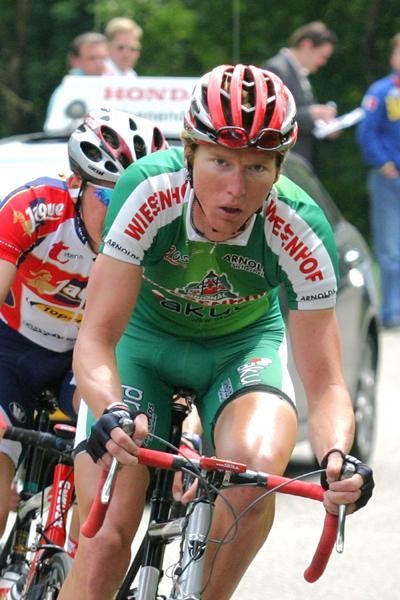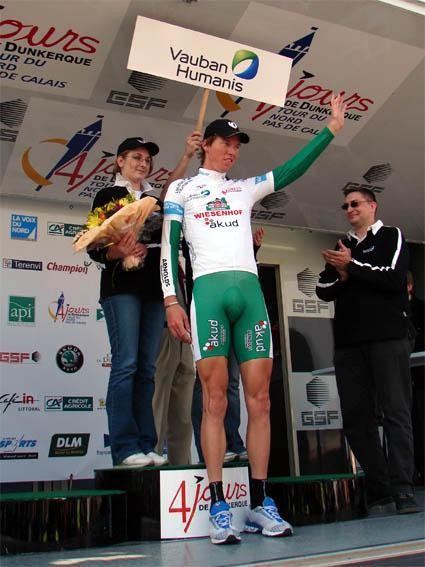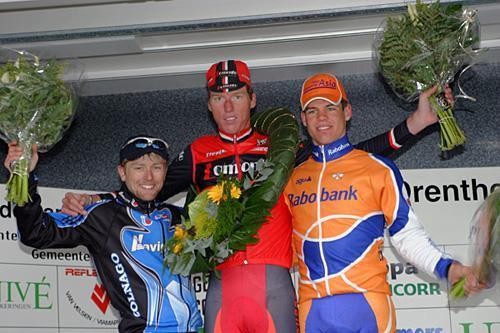The future of German Cycling: The Young Guns
The big names in German cycling are Jan Ullrich, Erik Zabel and Jens Voigt - ranging in age from 32...






The Future of German Cycling: The Young Guns Part 1, November 30, 2006
As Germany's hard hitters in the cycling world prepare to step aside for their apprentices to take the spotlight, Cyclingnews' Susan Westemeyer reveals the third generation of riders waiting in the wings to fly the nation's flag
The big names in German cycling are Jan Ullrich, Erik Zabel and Jens Voigt - ranging in age from 32 to 36, and all looking to the end of their careers. It has long been predicted that Ullrich's retirement would mean the end of pro cycling in Germany, but a number of new names and fresh young faces have appeared on the scene to spark new interest – Stefan Schumacher, Fabian Wegmann and Patrik Sinkewitz, for example. At 25 to 26-years-old, with four or five years professional experience behind them, they are coming into their prime.
But that also means that they should start looking over the shoulders, as the next generation of young riders looks to establish itself. Cyclingnews will look at three of these young up-and-coming Germans, one from each of the German (or half-German) ProTour teams, and follow them over the coming season as they seek to make their names and establish their reputations.
Milram's Marcel Sieberg
Team Milram will see the ProTour debut of Marcel Sieberg in 2007. The tall redhead is excited about his debut with the outfit. "It has always been my goal to ride in the ProTour. I'm even happier because this dream is coming true with Team Milram, because I have a lot of friends there and will surely feel comfortable there." The decision to sign with the Italian-German team was easy, he said, "because I always liked the team and the riders."
The main attraction for the sprinter is, naturally, the big-name sprinters at Milram: Alessando Petacchi and Erik Zabel. "They are both world-class riders. Plus Erik is an extremely good one-day racer," said the 24-year-old. "Both of them are very experienced and have lots of wins, and I hope that they will help me develop."
Get The Leadout Newsletter
The latest race content, interviews, features, reviews and expert buying guides, direct to your inbox!
Sieberg, who lives in Dortmund, started his career in 2005 with the German continental team Lamonta before moving up a notch to professional continental team Wiesenhof-Akud in 2006. "My year at Wiesenhof was very good. I learned a lot from the older riders, I fit in well with the team and often had the opportunity to ride for myself," explained Sieberg. "Through our strong sprinter Gerald Ciolek I was able to improve myself in preparing a sprint, which I hope I can continue to build on at Milram."
He got off to a good start in 2006, with his very first race, the Tour of Qatar, where he went up against such riders as Zabel and Tom Boonen. He was eagerly looking forward to the Spring Classics, which he sees as his speciality, having won the Ronde von Drenthe in 2005. "I like the Belgian and Netherlands races a lot, with their bad weather, pave, and hard racing - all of those things particularly motivate me."
But it wasn't to be. The big man was laid low by a little bug – mononucleosis – forcing him to miss all of the Spring Classics. "In the middle of March I had to take a few weeks off, which put an end to my first season highlight. I recovered fairly quickly, although my doctor didn't believe it, and started preparing myself expressly for the fall Classics. Fortunately, it worked out." He finished tenth overall in the Four Days of Dunkirk, taking home the best young rider's jersey, and won a criterium in July while working his way back into shape.
It all came to a head on September 3, in Belgium, at the GP Jef Scherens. The race consists of 13 laps around a difficult 14 kilometre course. Shortly after 120 kilometres, a four-man escape group formed, closely followed by an 11-strong chase group, which included Sieberg. With two rounds to go, he attacked again, but was eventually caught by three riders. Not one to give up, he attacked yet again in the final lap, on a climb 1500 metres from the finish line. His three former companions were unable to catch him this time, and he won with a 14 second advantage. "After missing the spring season, it was my main goal to win a classic in the fall, and that it turned out to be such a difficult one just makes it that much better," Sieberg said modestly.
But that wasn't the end of his season. He closed out with an appearance in the World Championships. "Riding the World's at the end of the season was a very special experience for me," Sieberg noted, even if he didn't finish the race. "Of course it was an honour for me to start as a helper for such a strong national team. I did my best, and Erik almost won the gold medal."
"Sibi" is yet find out what will be on his race calendar for 2007 - that will be discussed at the team meeting in Italy the beginning of December. He hopes that it will concentrate on the Spring Classics - a theme that pops up often in his answers. His role at Milram? "That will develop over the season. It is my dream to take part in the sprint train and to be used in the Classics." For the future, he hopes to "concentrate on the Classics, where I see my strengths." And the race that he would most like to win is, of course, "one of the big Classics, like Paris-Roubaix." But until then, he is willing to be patient. "I hope that I can develop myself enough over the next few years so that I will be able to be in the front in big races."
Who does he see as the best sprinter in the peloton right now? "I think this year it would have to have been Boonen. Petacchi was injured, but I think he'll be back faster than ever next year."
And when asked who he sees as the future of German cycling, he picks riders from the two rival German teams. Gerolsteiner's Stefan Schumacher: "is already practically one of the greats," and former teammate, soon-to-be T-Mobiler Gerald Ciolek: "will be up there within five years," finished Sieberg.
Click here for The future of German cycling Part 2: Heinrich Haussler
Click here for The future of German cycling Part 3: Gerald Ciolek